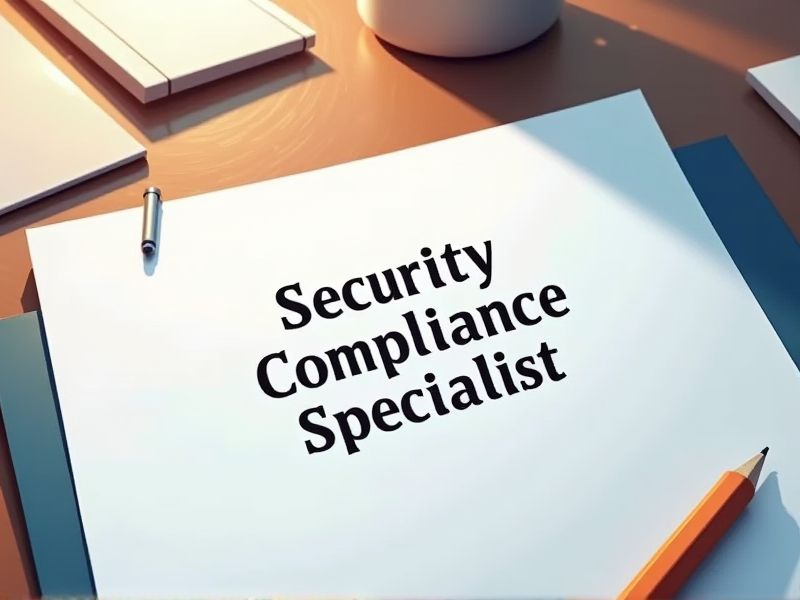
Security Compliance Specialists play a critical role in safeguarding organizational data and ensuring adherence to regulatory standards, thereby minimizing risks. Holding specific certifications enhances their credibility, providing a structured understanding of various compliance frameworks and security protocols. Employers often require these credentials to ensure that specialists possess the necessary skills to navigate complex compliance landscapes. Some important certifications you may need for a Security Compliance Specialist include those in compliance management and information security.
Certified Information Systems Security Professional (CISSP)
Holding a Certified Information Systems Security Professional (CISSP) credential enables a Security Compliance Specialist to demonstrate a comprehensive understanding of all aspects of information security, crucial for ensuring adherence to regulatory requirements. Because numerous regulations demand a rigorous approach to data protection, CISSP equips professionals with knowledge to design and manage security protocols in compliance with such standards. Employers often seek CISSP-certified specialists to manage compliance risks effectively, reducing potential legal and financial liabilities. As security threats evolve, the certification ensures the specialist stays informed about the latest security practices and technologies, addressing emerging risks promptly.
Certified Information Security Manager (CISM)
Organizations face increasing cybersecurity threats, making the CISM certification critical for a Security Compliance Specialist to effectively manage risks. The CISM provides expertise in overseeing, developing, and managing information security, directly influencing a company's capability to comply with industry regulations. Companies often demand such certified professionals to ensure regulatory and policy adherence, protecting sensitive information from breaches. The CISM credential signals practical experience in information security governance, crucial for aligning security strategies with business objectives.
Certified Information Systems Auditor (CISA)
Pursuing the Certified Information Systems Auditor (CISA) credential equips Security Compliance Specialists with a deep understanding of risk management and governance principles, aligning security practices with industry standards. This certification validates expertise in auditing, control, and security of information systems, which is critical for identifying and mitigating compliance risks. Organizations seek professionals with CISA to ensure comprehensive system evaluations and adherence to regulatory requirements. Having CISA-certified specialists in a team enhances credibility and assures stakeholders that the organization is committed to maintaining robust security compliance.
Certified in Risk and Information Systems Control (CRISC)
CRISC certification provides security compliance specialists with a structured understanding of risk management principles, which is crucial for aligning security measures with organizational goals. This credential equips professionals with the skills to design and implement information systems controls that comply with industry regulations. Employers value CRISC-certified individuals for their proven ability to identify and assess risks, contributing to more robust security strategies. Achieving CRISC certification validates a specialist's capability to support compliance programs effectively, reducing potential security breaches and enhancing organizational resilience.
CompTIA Security+
CompTIA Security+ provides foundational knowledge in security principles, which is essential for a Security Compliance Specialist to understand risk management and threat mitigation. The certification covers key areas such as network security, identity management, and cryptography, aligning with many compliance frameworks. Employers often require this certification to ensure that specialists can implement security policies and adhere to legal regulations. Possessing Security+ indicates a validated understanding of best practices in security, crucial for ensuring organizational compliance.
ISO/IEC 27001 Lead Implementer
The ISO/IEC 27001 Lead Implementer certification provides an organization with a structured framework to develop, implement, and manage an effective information security management system (ISMS). Possessing this certification ensures the Security Compliance Specialist can align security practices with international standards, enhancing trust and credibility. Implementing ISO/IEC 27001 helps in systematically identifying, assessing, and mitigating security risks, leading to reduced vulnerabilities. This qualification empowers the specialist to foster continuous improvement within the organization's security compliance initiatives.
Certified Cloud Security Professional (CCSP)
Organizations face increasing regulatory demands, which necessitates specialized knowledge to navigate complex cloud environments. A Certified Cloud Security Professional (CCSP) brings expertise in cloud security, aligning practices with industry standards. This certification ensures the development and maintenance of secure cloud infrastructures, fulfilling compliance requirements. Mastery in cloud security concepts supports organizations in avoiding fines and mitigating risks.
Certified Ethical Hacker (CEH)
A Security Compliance Specialist benefits from becoming a Certified Ethical Hacker (CEH) because it provides a deep understanding of potential vulnerabilities within a system. This knowledge is crucial for identifying and mitigating security risks to ensure compliance with industry standards and regulations. Insight into hacking techniques gained through CEH certification allows specialists to proactively develop strategies to protect sensitive data. CEH certification also enhances the credibility and trustworthiness of a Security Compliance Specialist when consulting on cybersecurity matters.
GIAC Security Essentials (GSEC)
Possessing the GIAC Security Essentials (GSEC) certification ensures that a Security Compliance Specialist has a comprehensive understanding of essential cybersecurity concepts, which is crucial for implementing effective security policies. The certification validates the specialist's ability to identify vulnerabilities and apply effective countermeasures, aligning with regulatory compliance requirements. A GSEC holder is equipped to address a wide range of security threats, reducing the risk of non-compliance with industry standards. The credential strengthens a specialist's capability to manage security operations and audits, promoting an organization's adherence to compliance mandates.
Certified Data Privacy Solutions Engineer (CDPSE)
Organizations face increasing regulatory requirements for data privacy, necessitating a skilled professional like a Certified Data Privacy Solutions Engineer (CDPSE) to ensure adherence to these standards. Security Compliance Specialists benefit from CDPSE's expertise in integrating privacy measures within technology platforms, reducing the risk of data breaches. CDPSE certification provides a comprehensive understanding of global data privacy laws, which helps organizations navigate complex compliance landscapes. Employing a CDPSE-certified professional improves an organization's ability to maintain customer trust and avoid costly fines associated with data protection violations.
Summary
When you obtain certifications as a Security Compliance Specialist, you enhance your credibility and expertise within the industry. This often results in increased trust from employers and colleagues, leading to more career advancement opportunities. Additionally, you may gain access to better job prospects and higher earning potential. Certifications help you stay updated with industry standards, improving your effectiveness in implementing security measures and ensuring compliance.
